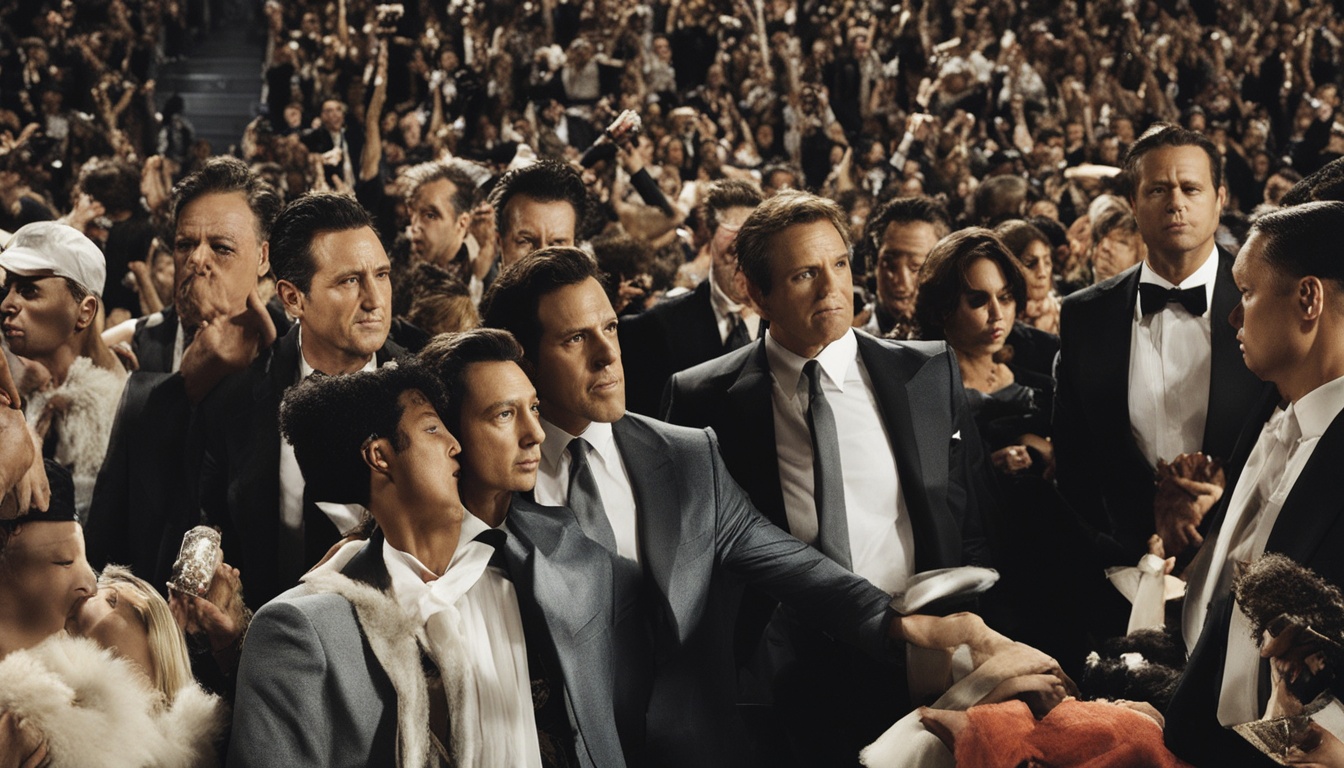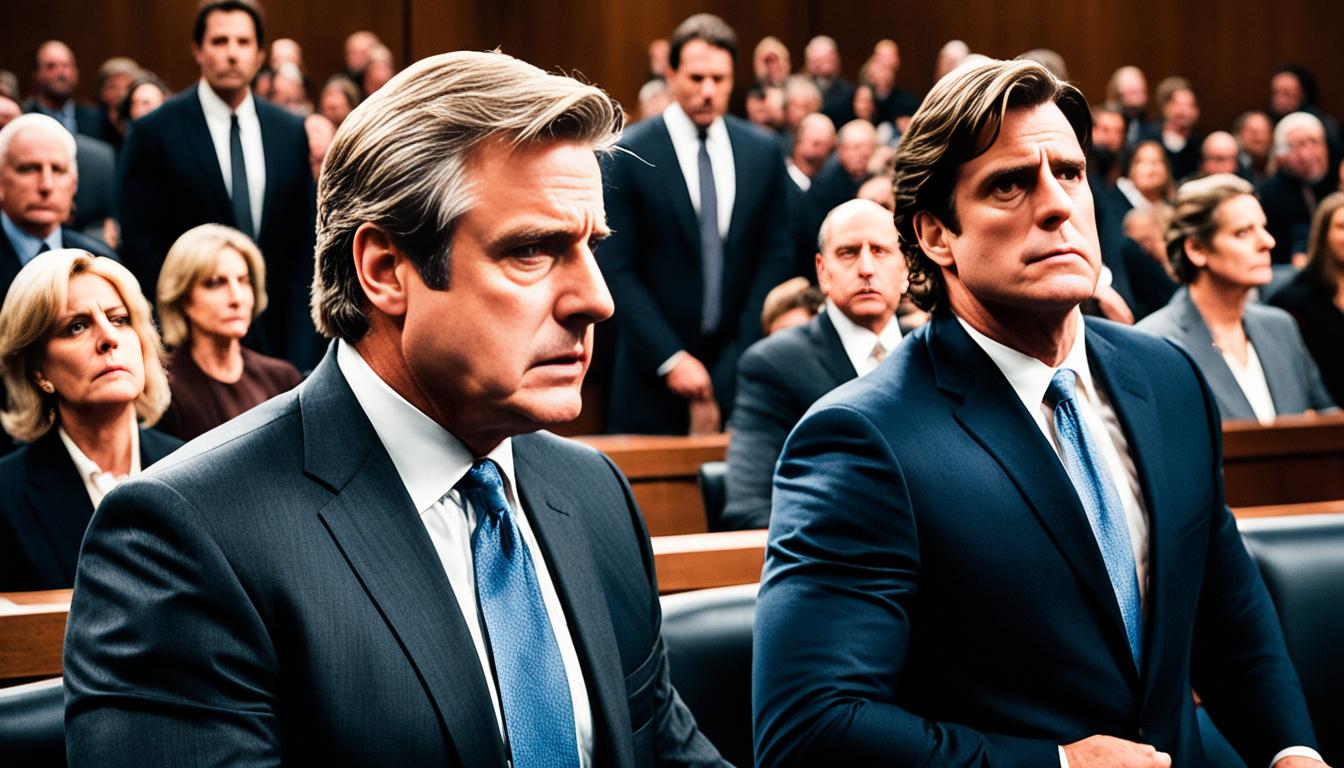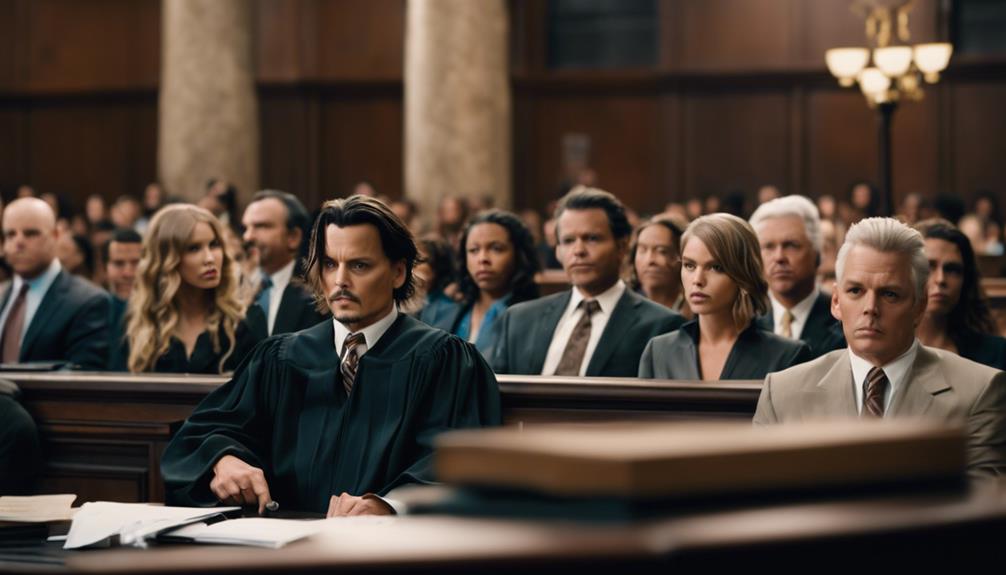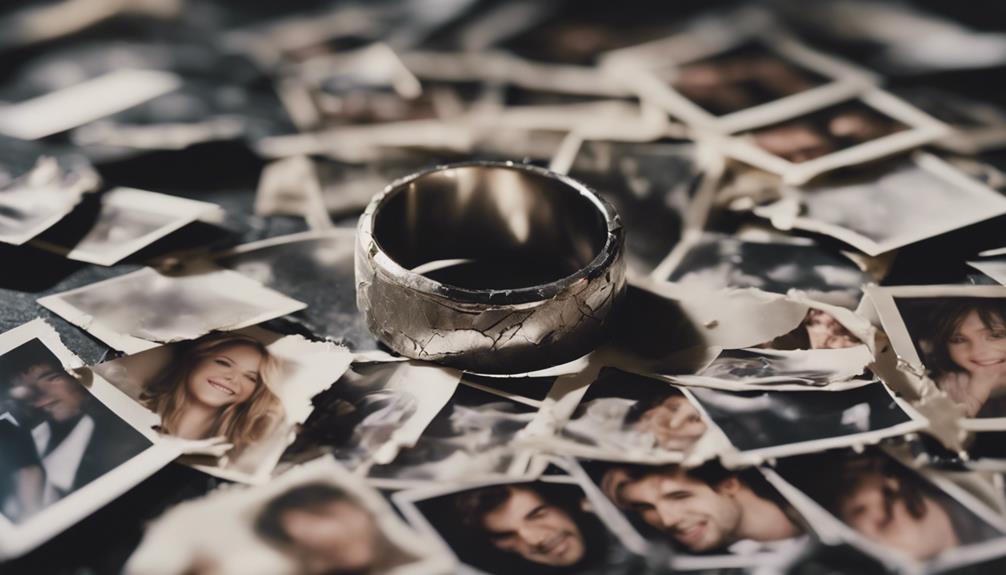Celebrity misconduct scandals have been making headlines and capturing public attention in recent years. From allegations of sexual misconduct to financial impropriety and drug-related incidents, the inappropriate behavior of famous individuals has far-reaching implications. These scandals not only affect the individuals involved but also have a significant impact on how the public perceives celebrities as a whole. Explore the insight and lasting effects of these scandals to gain a deeper understanding of their societal impact.
Key Takeaways:
- Celebrity misconduct scandals have a profound impact on individuals and society.
- They encompass a range of misconduct, from sexual to financial and drug-related.
- High-profile scandals like the Harvey Weinstein and Bill Cosby cases have sparked wider conversations.
- Misconduct scandals can lead to career setbacks and reputational damage for celebrities.
- Legal consequences, including criminal charges and civil lawsuits, can arise from these scandals.
Types of Celebrity Misconduct
Celebrity misconduct can take various forms, with some of the most common types including sexual misconduct scandals, financial misconduct scandals, and drug-related scandals.
Sexual misconduct scandals involve allegations of harassment, assault, or inappropriate behavior. These scandals often bring to light instances where celebrities abuse their position of power and exploit others in a sexual manner. The revelations surrounding such scandals have a significant impact on the individuals involved, as well as the public perception of celebrities.
Financial misconduct scandals typically involve issues such as embezzlement, tax evasion, or mismanagement of funds. These scandals expose instances where celebrities misuse their wealth and influence for personal gain, often resulting in legal consequences and monetary loss. The fallout from financial misconduct scandals can tarnish the reputation of the individuals involved and damage their standing in the public eye.
Drug-related scandals encompass instances where celebrities are involved in drug abuse or possession. These scandals bring attention to issues of substance abuse within the entertainment industry and can have profound impacts on the careers and personal lives of the individuals involved. Drug-related scandals may also shed light on the broader societal problem of drug addiction and the challenges faced by both celebrities and regular individuals in overcoming addiction.
Each type of misconduct scandal carries its own set of repercussions and consequences for the individuals involved, as well as broader implications for the public perception of celebrities. Understanding the different types of celebrity misconduct is crucial in comprehending the gravity and complexity of these scandals.
High-Profile Celebrity Misconduct Scandals
Over the years, there have been several high-profile celebrity misconduct scandals that have captivated the public’s attention. These scandals, involving the actions of famous individuals, have not only resulted in legal consequences but have also sparked widespread conversations about the prevalence of misconduct in the entertainment industry.
One of the most notable scandals is the Harvey Weinstein scandal, which exposed rampant sexual misconduct in Hollywood. Weinstein, a prominent film producer, was accused by numerous women of sexual harassment and assault. The revelations surrounding his behavior ignited the #MeToo movement, giving a voice to survivors of sexual abuse and drawing attention to the larger issue of harassment and assault in the industry.
The Bill Cosby scandal also made headlines and shocked the world. Cosby, a beloved comedian and actor, faced allegations of sexual assault from multiple women. The accusations spanned decades, leading to a highly publicized trial and ultimately resulting in his conviction. The Cosby scandal served as a wake-up call, shedding light on the abuse of power and the need for justice in cases of sexual misconduct.
Similarly, the Kevin Spacey scandal exposed allegations of sexual misconduct within the entertainment industry. Spacey, a renowned actor, faced numerous accusations of inappropriate behavior, including sexual assault. His scandal contributed to the larger conversation about abuse and misconduct in Hollywood, highlighting the need for change and accountability.
“These high-profile scandals have brought the issue of celebrity misconduct to the forefront of public consciousness, ultimately paving the way for much-needed discussions and systemic change.”
These high-profile scandals serve as stark reminders of the need to address and prevent misconduct in the entertainment industry. The legal consequences faced by those involved demonstrate that no one is above the law, regardless of their fame or influence. Additionally, these scandals have prompted a shift in public perception and a demand for greater accountability from celebrities and industry professionals.
Comparison of High-Profile Celebrity Misconduct Scandals
| Scandal | Key Allegations | Legal Consequences |
|---|---|---|
| Harvey Weinstein scandal | Widespread sexual misconduct in Hollywood | Convicted of rape and sexual assault |
| Bill Cosby scandal | Multiple allegations of sexual assault | Convicted of sexual assault |
| Kevin Spacey scandal | Allegations of sexual misconduct | Legal proceedings ongoing |
These scandals have had a lasting impact on the entertainment industry and society as a whole. They have sparked important conversations about power dynamics, consent, and the need for safer and more inclusive work environments. The public scrutiny surrounding these high-profile scandals has also highlighted the importance of supporting survivors and fostering cultural change.
With the ongoing discussion surrounding celebrity misconduct scandals, it is clear that there is still much work to be done to ensure the safety and integrity of the entertainment industry. Only through continued dialogue and action can lasting change be achieved.
https://www.youtube.com/watch?v=d7vAw9q8hWg
Impact on Careers and Reputations
Celebrity misconduct scandals can have significant repercussions on the careers and reputations of the individuals involved. When a celebrity is confronted with misconduct allegations, the consequences can be far-reaching, leading to a tarnished reputation and a public backlash that can have long-lasting effects.
One of the most immediate impacts of a misconduct scandal is the decline in career opportunities for the accused celebrity. Sponsorship deals, movie roles, and endorsements that were once readily available may suddenly disappear as companies distance themselves from the scandal and the tarnished reputation associated with it. The career consequences of misconduct can be particularly devastating for actors, musicians, and public figures who heavily rely on public perception and approval for their success.
The public backlash is another significant consequence of celebrity misconduct scandals. Fans and the general public often express their disappointment, anger, and outrage towards the accused individual, leading to boycotts of their work and a loss of support. Social media platforms amplify these reactions, with hashtags and trending topics further fueling the public’s negative sentiments. The public backlash not only affects the accused celebrity but can also impact the success and reception of projects they are associated with.
“It takes years to build up trust, and only seconds to destroy it. In the case of celebrity misconduct scandals, the consequences can be devastating, both personally and professionally.”
The fallout from a misconduct scandal can be particularly challenging for celebrities who have built their careers on a positive and beloved public image. The sudden revelation of misconduct shatters the carefully crafted persona and can lead to a loss of credibility and trust. Recovering from a tarnished reputation often requires a significant amount of time, effort, and strategic PR maneuvers.
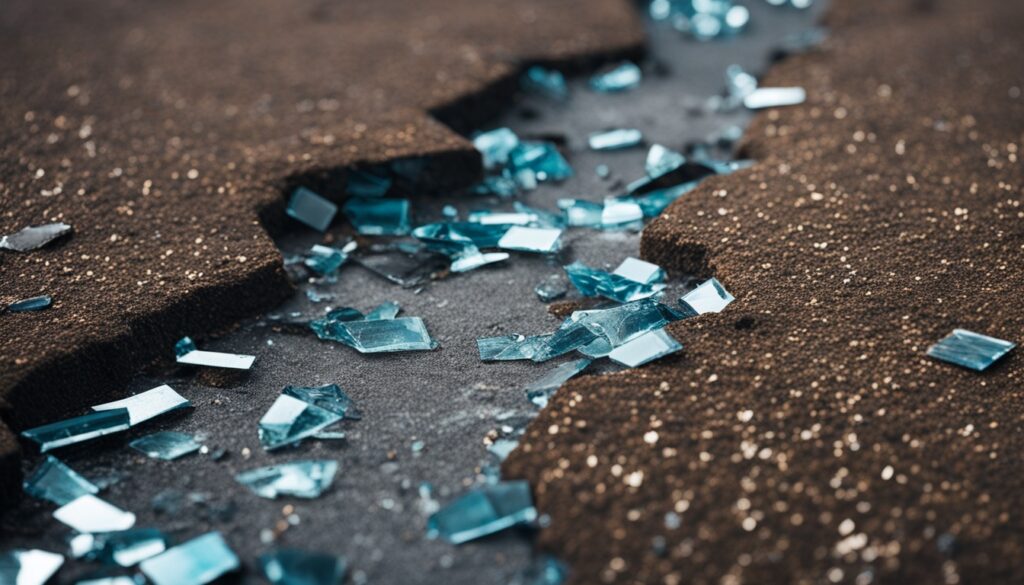
Impact on the Entertainment Industry
The impact of celebrity misconduct scandals extends beyond the individuals involved. The entertainment industry as a whole can also experience the fallout from such scandals. Production companies, record labels, and other industry players may face public scrutiny and backlash for their association with the accused individuals.
This negative attention can lead to a decline in public trust and consumer confidence in the industry. The resulting loss of revenue and reputation can have a ripple effect on the careers of other artists and professionals, as well as the overall functioning of the entertainment industry.
| Effects of Celebrity Misconduct Scandals | Careers | Reputations | Public Reception |
|---|---|---|---|
| Decline in career opportunities | Tarnished public image | Public backlash and boycotts | |
| Loss of endorsements and sponsorships | Loss of credibility and trust | Damage to the success of associated projects |
It is crucial for individuals in the entertainment industry to recognize the consequences of misconduct and take proactive steps to prevent and address such behavior. Implementing stricter policies, fostering a culture of respect and accountability, and supporting survivors are some of the ways the industry can work towards creating a safer and more inclusive environment.
Legal Ramifications
Celebrity misconduct scandals can have serious legal consequences that can significantly impact the lives and careers of the individuals involved. Depending on the severity of the allegations, misconduct can lead to criminal charges and civil lawsuits.
Criminal Charges
In cases of severe misconduct such as sexual assault or fraud, individuals facing misconduct accusations may face criminal charges. These charges can result in legal proceedings and, if found guilty, the accused may face imprisonment, fines, probation, or other penalties determined by the court.
The legal process surrounding celebrity misconduct scandals can be complex and lengthy, involving investigations, evidence gathering, hearings, and trials. The outcome of the criminal case can have a profound impact on the accused’s freedom, reputation, and future prospects.
Civil Lawsuits
Victims of celebrity misconduct often have the option to pursue civil lawsuits against the accused individuals. These lawsuits seek compensation for damages related to the misconduct, including emotional distress, physical harm, loss of income, or damage to reputation.
Civil lawsuits provide victims with the opportunity to seek justice and hold the responsible parties accountable for their actions. The outcome of a civil lawsuit can result in financial settlements or judgments against the accused, providing validation and potential compensation for the harm suffered.
The legal consequences of celebrity misconduct can have far-reaching effects on the individuals involved. The financial and reputational implications can be substantial, leading to career setbacks, loss of endorsement deals, and public scrutiny.
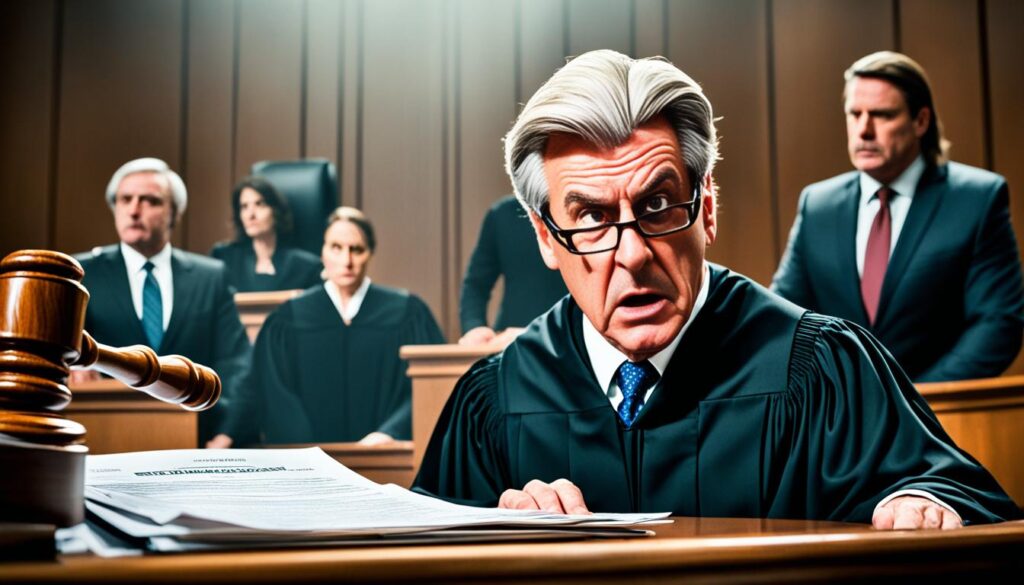
Societal Reactions and Cultural Shifts
When celebrity misconduct scandals come to light, they often spark public outrage and trigger significant societal reactions. These scandals serve as a catalyst for cultural change, as they bring important issues such as sexual harassment and abuse into the mainstream conversation. The societal response to these scandals has led to increased awareness and a demand for accountability, both from the individuals involved and the systems that enable such behavior.
One prominent example of this cultural shift is the #MeToo movement, which gained momentum following the Harvey Weinstein scandal. The movement empowered survivors of sexual misconduct to share their stories and demand change across various industries, extending beyond the realm of entertainment. It shed light on the pervasiveness of misconduct and highlighted the need for systemic reforms to prevent future instances.
The societal response to celebrity misconduct scandals has emphasized the importance of holding individuals accountable for their actions. The public is no longer willing to turn a blind eye to misconduct, demanding that those responsible face consequences for their behavior. This push for accountability has created a ripple effect, prompting organizations and institutions to reassess their practices and implement measures to prevent and address misconduct.
“The societal response to celebrity misconduct scandals has highlighted the importance of addressing and preventing such behavior.”
Raising Awareness and Provoking Dialogue
One significant outcome of the societal response to these scandals is the increased awareness surrounding issues of misconduct and abuse. By putting a spotlight on these topics, society has become more informed about the prevalence and various manifestations of misconduct. This heightened awareness has created opportunities for honest discussions about power dynamics, consent, and the importance of fostering safe and respectful environments.
Celebrity misconduct scandals have provided a platform for victims and survivors to share their experiences and break the silence surrounding such misconduct. This sharing of stories has not only given survivors a voice but also helped others to understand the scope and impact of misconduct. It has fostered empathy, unity, and a collective commitment to prevent future harm.
The Role of Accountability
One of the key factors driving cultural change in the wake of celebrity misconduct scandals is the demand for accountability. Society is demanding that those responsible for misconduct face consequences for their actions. This push for accountability extends beyond individual celebrities and seeks to challenge the structures and systems that enable and perpetuate such behavior.
Accountability involves holding individuals responsible for their actions, as well as holding organizations and institutions accountable for fostering safe and inclusive environments. This includes implementing stricter policies, ensuring transparency in reporting and investigations, and adopting a zero-tolerance approach towards misconduct.
The societal demand for accountability has prompted industries, such as entertainment, to reevaluate their practices and make necessary changes to protect their employees and members. This includes the development of codes of conduct, the creation of safe reporting mechanisms, and the establishment of independent bodies to address misconduct allegations.
Cultural Change and Lasting Impact
The societal response to celebrity misconduct scandals has demonstrated that society is no longer willing to tolerate or dismiss such behavior. It has forced a reckoning with the prevailing attitudes and structures that have allowed misconduct to go unchecked for far too long.
The impact of the societal response to these scandals extends beyond individual cases. It has created a cultural shift in which workplace environments and societal expectations are evolving to prioritize respect, equality, and safety. This shift is a step towards fostering a society that is intolerant of misconduct, promotes accountability, and supports survivors.
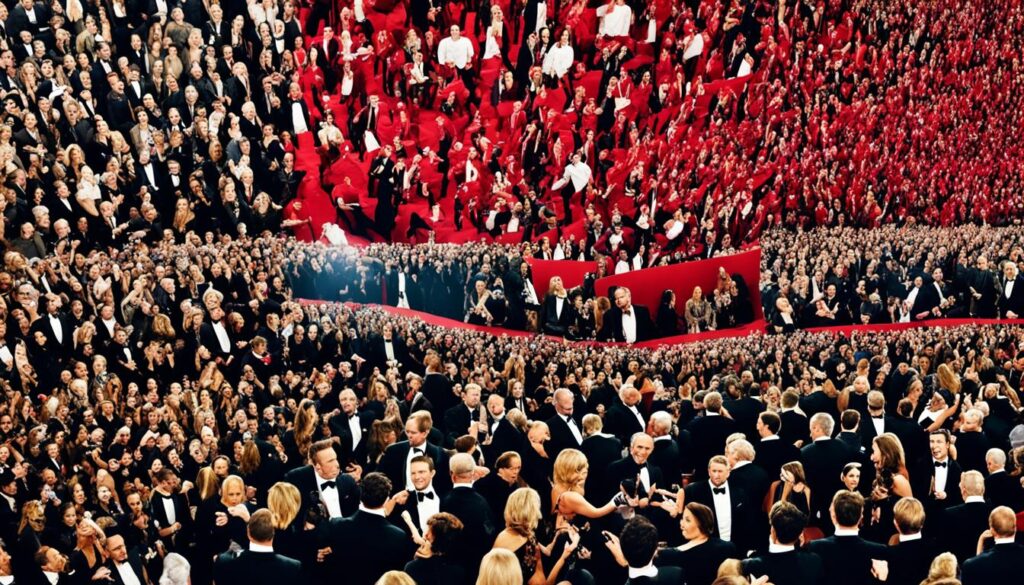
In conclusion, celebrity misconduct scandals have ignited significant societal reactions and triggered cultural shifts. These scandals have raised awareness, provoked dialogue, and demanded accountability for misconduct. The ongoing societal response continues to drive cultural change, highlighting the need for safer and more respectful environments for all individuals.
Media Coverage and Public Interest
The media plays a significant role in the coverage of celebrity misconduct scandals, with the public’s fascination often driving extensive attention to these incidents. The portrayal of scandals in the media can shape public opinion and generate intense scrutiny of the individuals involved. The paparazzi culture further contributes to the heightened interest in such scandals, as the public eagerly seeks details and updates on unfolding events. The media’s coverage of celebrity misconduct scandals can have a profound impact on the public perception of the individuals involved and shape the overall narrative surrounding the scandal.
Media outlets understand the public’s curiosity regarding the personal lives of famous individuals, and they often capitalize on this fascination to generate higher viewership or readership. By sensationalizing these scandals, the media can attract attention and increase engagement. Headlines and narratives are carefully crafted to draw in audiences and satisfy their cravings for scandalous stories.
Media coverage of celebrity misconduct scandals often focuses on the sensational aspects of the incidents, emphasizing the shocking or salacious details to capture public interest.
The paparazzi culture also plays a significant role in fueling public interest in celebrity scandals. Paparazzi photographers are known for relentless pursuit, hoping to capture exclusive photos or videos of celebrities in compromising situations.
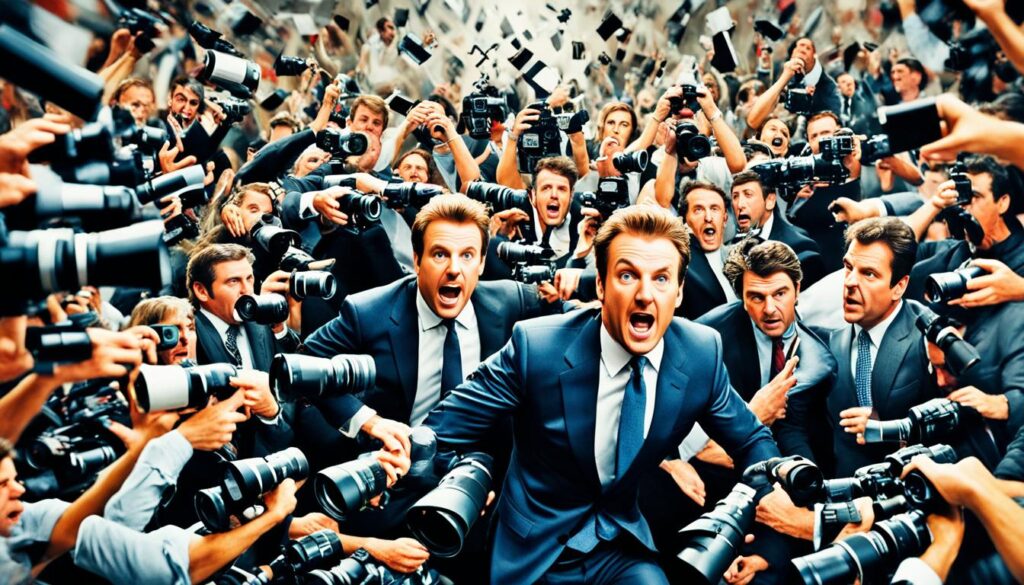
The intense media coverage and public fascination with scandals can have both positive and negative consequences. On one hand, it can lead to a broader conversation about the importance of holding celebrities accountable for their actions and addressing systemic issues. The exposure of misconduct can prompt discussions about the power dynamics and ethical concerns within industries such as entertainment. It can also urge individuals to reflect on their own behaviors and attitudes towards consent, respect, and boundaries.
On the other hand, media coverage can sometimes become intrusive and invasive, especially when it involves paparazzi. The constant pursuit and invasion of privacy can have significant negative effects on the mental and emotional well-being of celebrities. It can also perpetuate harmful stereotypes and contribute to the objectification of individuals in the public eye.
Media’s Role in Shaping Public Opinion
The media has the power to influence public opinion through its coverage of celebrity misconduct scandals. The way scandals are framed, the perspectives highlighted, and the narratives constructed can shape how the public perceives the individuals involved and the actions they have committed.
When the media focuses solely on the scandalous aspects of a celebrity’s misconduct, it can overshadow other aspects of their life and work. This one-dimensional portrayal may lead to harsh judgment and a loss of public support. Conversely, if the media emphasizes efforts at redemption, rehabilitation, or personal growth of the individuals involved, it can influence public opinion and potentially aid in their career recovery.
The media’s portrayal of scandals can profoundly impact the public’s perception of the individuals involved, shaping their reputations and future opportunities.
It is crucial for the media to strike a balance between providing factual coverage and respecting individuals’ privacy and dignity. Responsible reporting ensures that the public receives accurate information while considering the potential harm that sensationalized coverage can cause.
Public Fascination with Scandals
The public’s fascination with celebrity scandals can be attributed to various factors. The allure of fame and fortune, coupled with the desire for escapism, makes the personal lives of celebrities an intriguing subject. Scandals provide a glimpse behind the glamorous facade, reminding the public that celebrities are fallible and subject to the same flaws and mistakes as anyone else.
Moreover, scandals often serve as a form of entertainment and a source of discussion among friends, colleagues, and even strangers. They become cultural touchpoints, generating debates and opinions that further fuel public interest.
Paparazzi Culture: A Catalyst for Intrigue
The paparazzi culture, characterized by photographers chasing after celebrities seeking exclusive photos and videos, intensifies the public fascination with scandals. The relentless pursuit and capture of compromising moments amplify the drama and intrigue surrounding celebrity misconduct.

However, the paparazzi culture has faced significant criticism due to its infringement on privacy and its potential to contribute to dangerous situations. Many celebrities have spoken out about the negative impacts of paparazzi intrusion, emphasizing the need for boundaries and respect.
Media Coverage of Celebrity Misconduct Scandals
| Positive Aspects | Negative Aspects |
|---|---|
| Raises awareness about misconduct issues | Potential invasion of privacy |
| Prompts discussions about accountability | Sensationalization and distortion of facts |
| Highlights the need for societal change | Perpetuation of harmful stereotypes |
| Encourages reflection on personal behavior | Loss of public support and career opportunities |
Measuring the Long-Term Impact
Celebrity misconduct scandals can have lasting effects on the individuals involved and the public perception of them. The consequences of such scandals go beyond the immediate fallout, often shaping the course of careers and personal lives for years to come. While some individuals are able to recover their careers and regain public favor, others face significant challenges in rebuilding their reputation and securing new opportunities.
The lasting impact of a scandal depends on various factors. The severity of the misconduct plays a crucial role, with scandals involving egregious offenses having a more profound and enduring effect on an individual’s career and public image. Additionally, the way the individual responds to the allegations also impacts the trajectory of their recovery. Taking responsibility, showing remorse, and actively seeking to make amends can contribute to public forgiveness and the potential for career rehabilitation.
Societal attitudes towards forgiveness and second chances also play a role in measuring the long-term impact of celebrity scandals. While some scandals may result in permanent reputational damage, others allow for the possibility of redemption, particularly if the individual demonstrates genuine remorse and takes concrete steps towards personal growth and positive change.
It is important to note that the long-term impact of a scandal is not solely determined by the individual involved, but by the collective memory and forgiveness of the public. Public sentiment can shift over time, leading to increased acceptance and the potential for career revival. However, forgiveness is not easily granted, and it often takes consistent effort and demonstration of growth on the part of the individual.
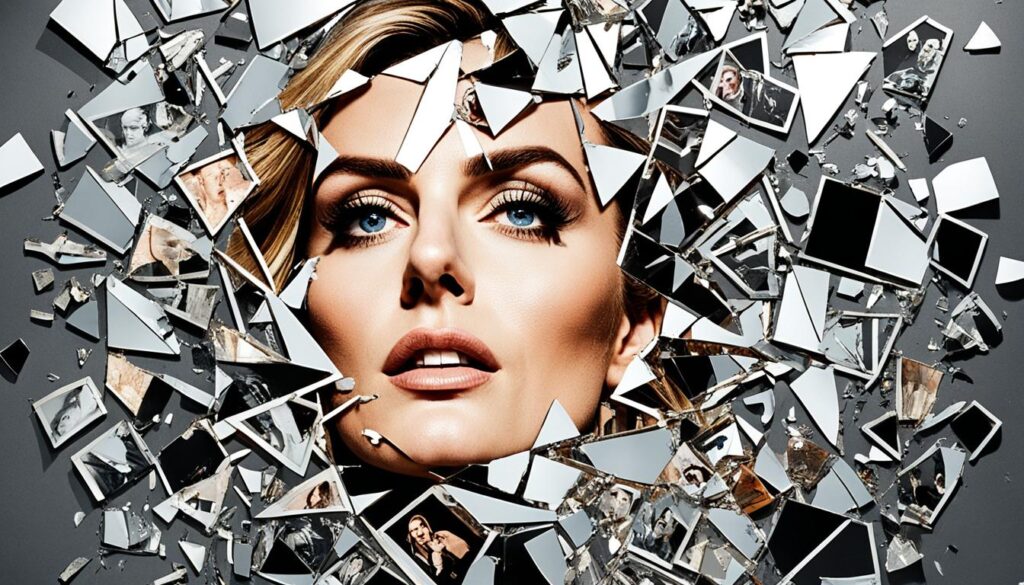
Accountability and Change in the Industry
In response to high-profile celebrity misconduct scandals, the entertainment industry has taken a hard look at its own shortcomings and made efforts to implement necessary changes. Recognizing the need for a more ethical and respectful working environment, many organizations have adopted stricter codes of conduct and comprehensive workplace policies to prevent and address misconduct. This industry-wide response demonstrates a commitment to improving the overall quality of workplace environments and ensuring the well-being of all individuals involved.
“We firmly believe in upholding the highest standards of professionalism and conduct within our organization. In light of recent scandals, we have revised and strengthened our code of conduct to explicitly address the issues surrounding misconduct. We are committed to maintaining a safe and inclusive workplace for all employees, free from harassment or any form of discrimination.”
Prioritizing Diversity and Inclusion
Alongside addressing misconduct, the industry is placing increased emphasis on promoting diversity, inclusion, and gender equality. By creating more opportunities for underrepresented groups, this shift aims to foster a more inclusive and equitable industry. Recognizing the importance of diverse voices and perspectives, organizations are actively working to provide equal opportunities for individuals from all backgrounds, eliminating biases and creating platforms for marginalized communities.
A Commitment to Safer Workplaces
The industry’s response to misconduct scandals has resulted in a renewed commitment to creating safer and more respectful workplaces. This includes implementing comprehensive training programs to educate employees about appropriate behavior and organizational policies. Additionally, support systems and reporting mechanisms have been established to ensure that victims of misconduct are provided with the necessary resources and avenues for reporting incidents.

Fostering Positive Change
The accountability prompted by high-profile misconduct scandals has sparked a collective effort within the industry to foster positive change. Through ongoing discussions and collaborations, stakeholders are actively working towards creating an industry culture that prioritizes transparency, ethics, and accountability. This commitment goes beyond individual organizations, as industry-wide initiatives are being established to promote responsible practices and create a more supportive and respectful community.
| Industry Response Initiatives | Description |
|---|---|
| Harassment Prevention Training | Mandatory training programs aimed at educating employees about appropriate behavior, consent, and workplace boundaries. |
| Diversity and Inclusion Programs | Efforts to increase representation of underrepresented groups, promote diversity, and remove barriers to entry. |
| Reporting Hotlines and Support | Establishment of confidential helplines and support systems for reporting incidents and providing resources to victims of misconduct. |
| Collaborative Codes of Conduct | Industry-wide agreement on ethical guidelines and responsible behavior to ensure a safer and more inclusive working environment. |
These initiatives represent a collective commitment to transform the industry into a more accountable, inclusive, and respectful space for all individuals. It is through these efforts that the industry aims to learn from past mistakes and implement lasting change, ultimately fostering an environment where talent can thrive and creativity can flourish.
Empowering Survivors and Supporting Victims
Celebrity misconduct scandals have shed a spotlight on the urgent need for support and resources for survivors of misconduct. As these scandals continue to raise awareness and spark public discourse, more and more survivors are finding the courage to come forward and share their experiences. It is crucial that we, as a society, rally behind these survivors and provide them with the necessary support they need to heal and rebuild their lives.
Recognizing the importance of supporting survivors, organizations and support networks dedicated to helping them have gained increased recognition and funding. These organizations play a vital role in providing counseling, legal assistance, and other resources to individuals affected by misconduct. Through their tireless efforts, survivors are provided with a safe space to share their stories and access the help they need to navigate the healing process.
Creating Awareness and Advocacy
Support for survivors goes beyond individual care. Raising awareness about the prevalence of misconduct and its devastating impact is essential for creating a more empathetic and understanding society. By shedding light on the experiences of survivors, we can challenge harmful societal norms, break down stigmas, and foster a culture of compassion and support.
Advocacy efforts aim to create systemic change by pushing for policies and legislation that protect survivors and hold perpetrators accountable. These initiatives work towards ensuring that survivors’ voices are not only heard but also respected and valued. Through increased awareness and advocacy, we can foster a society that prioritizes the well-being and justice of survivors.
“We must stand together to support survivors, empower their voices, and create lasting change in our communities.” – Organization for Survivor Empowerment
Accessing Counseling and Resources
Survivors of misconduct often face immense emotional trauma and may require professional counseling to help them heal. Counseling services provide a supportive and confidential environment where survivors can address their experiences, process their emotions, and develop healthy coping strategies. These services empower survivors to reclaim their lives and regain a sense of control and well-being.
In addition to counseling, survivors may need access to other essential resources. Legal assistance can help survivors navigate the complex legal process, seek justice, and protect their rights. Helplines and support networks offer immediate assistance and guidance, ensuring survivors have someone to turn to in times of crisis. These resources play a crucial role in ensuring survivors receive comprehensive support every step of the way.
Building a Supportive Community
Support for survivors extends beyond professional services; it includes building a supportive community that uplifts and validates their experiences. Individuals can contribute to creating this community by actively listening to survivors without judgment, believing their stories, and offering empathy and understanding. By creating safe spaces where survivors can share their experiences, we can help break the isolation and shame that often accompanies the aftermath of misconduct.
Educating ourselves about the complexities of misconduct and understanding its impact allows us to become better allies to survivors. By challenging victim-blaming narratives and promoting empathy and validation, we create an environment that empowers survivors to heal, grow, and thrive.

Support for survivors is an ongoing commitment that requires collective effort. By actively advocating for change, providing critical resources, and fostering a supportive community, we can empower survivors and create a society that stands against misconduct in all its forms.
Conclusion
Scandals involving celebrity misconduct have a profound impact on individuals, the entertainment industry, and society as a whole. These scandals have sparked important discussions about accountability, cultural change, and supporting survivors. The lasting effects of these scandals continue to shape public perception and influence the way the industry operates. Ongoing conversations and efforts are vital to foster a safer and more inclusive environment, where misconduct is not tolerated and the voices of survivors are heard and respected.
The impact of celebrity misconduct can be seen in the way society responds to these scandals. As the public becomes more aware of such behavior, there is a growing demand for accountability from those in positions of power. This increased awareness has led to important cultural shifts, encouraging a change in attitudes and behaviors towards misconduct.
Furthermore, ongoing discussions surrounding celebrity misconduct are crucial for creating lasting change. It is through these conversations that society can address the root causes of misconduct and work towards prevention. By providing support for survivors and raising awareness, the industry can strive to create a more inclusive and safe environment for all individuals. Together, these efforts contribute to the ongoing evolution of societal norms and values.
FAQ
What is celebrity misconduct?
Can you provide examples of high-profile celebrity misconduct scandals?
What are the consequences of celebrity misconduct on their careers and reputations?
Are there legal ramifications for celebrities involved in misconduct scandals?
How do celebrity misconduct scandals impact society?
How does the media contribute to the coverage of celebrity misconduct scandals?
Do celebrity misconduct scandals have long-term effects?
Have there been any changes in the entertainment industry as a result of these scandals?
How do celebrity misconduct scandals impact survivors and victims?
What is the overall impact of celebrity misconduct scandals?
Source Links
- https://cultbox.co.uk/news/wednesday-season-2-cast-revealed-as-the-show-enters-production
- https://www.dailymail.co.uk/news/article-13393563/Bremer-Bay-doctor-GP-health-access.html
- https://www.dailymail.co.uk/news/article-13392391/Female-driver-left-terrified-fake-police-officer-tried-pull-waving-black-wallet-motorway-emerges-police-bungled-probe-not-quiz-man.html

